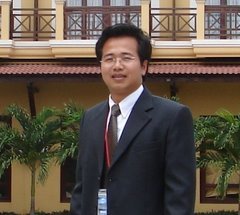Monday, July 09, 2007
A new blog
Wednesday, May 23, 2007
Why Did You Fail the Exam?
A Khel: It's not the fault of the student if he fails, because the year ONLY has 365' days.
Typical academic year for a student:
1. Sundays-52, Sundays in a year, you know Sundays are for rest. Days left 313.
2. Summer holidays-50 where weather is very hot and difficult to study. Days left 263.
3. 8 hours daily sleep- 130 days GONE. Days left 141.
4. 1 hour for daily playing- (good for health) means 15 days. Days left 126.
5. 2 hours daily for food & other delicacies (chewing properly & swallowing)-means 30 days. Days left 96.
6. 1 hour for talking (man is a social animal)-means 5 days. Days left 81.
7. Exam days- per year at least 35 days. Days left 46.
8. Quarterly, Half yearly and festival (holidays)-40 days.Balance 6 days.
9. For sickness- at least 3 days. Remaining days=3.
10. Movies and functions - at least 2 days. 1 day left.
11. That 1 day is your birthday.
How can you study on that day??????!!!!
Balance = 0
How can a student pass?
Tuesday, April 17, 2007
Winners Announced in Asia and Pacific Student Essay Competition

The winners are:
- Thinley Choden of Bhutan, University of Hawaii at Manoa, age 28
- Chanprathna Leng of Cambodia, International University of Japan, age 27
- Heng Dyna of Cambodia, Nagoya University, Japan, age 24
- Rotha Chan of Cambodia, International University of Japan, age 26
- Li Xing of the People’s Republic of China, China Agricultural University, age 19
- Shana Khan of Fiji Islands, Victoria University of Wellington, New Zealand, age 27
- Kavindra Nand ofFiji Islands, The University of the South Pacific, age 23
- Leung Yih-Terng of Hong Kong, China;University of Hong Kong, age 22
- Sreya Bagchi of India, Randolph-Macon Women’s College, Lynchburg, VA, US, age 18
- Ramnath Kalyani of India, National Law School of India University Jawahar Shah of India, TERI University, age 21
- Syaiful Afifi of Indonesia, Brawijaya University Malang, age 23
- Terumi Ishii of Japan, The University of Tokyo, age 23
- Akiko Iwamoto of Japan, Gakushuin University, age 22
- Megumi Koba of Japan, International University of Kagoshima, age 22
- MeeHyoe Koo of theRepublic of Korea, Ewha Women’s University, age 21
- Elvira Bobekova ofKyrgyz Republic, The University of Auckland, New Zealand, age 29
- Bayarlkham Byambaa of Mongolia, Akita International University, age 19
- Tin Yadana Moe of Myanmar, Yangon Institute of Economics, age 23
- Muniba Mahmud of Pakistan, Institute of Business Administration, age 21
- Saba Majeed of Pakistan, Institute of Business Administration, age 23
- Carl Renan Estrellan of Philippines, Tokyo Institute of Technology, Japan, age 28
- Ritchie-Anne Guzman of Philippines, Ateneo de Manila University, age 26
- Charybel Magbuo of Philippines, De la Salle University, age 20
- Fundow Jerasakanon of Thailand, Ritsumeikan Asia Pacific University, age 21
- Le Hoang Anh Thu of Viet Nam, Ritsumeikan Asia Pacific University, age 25






